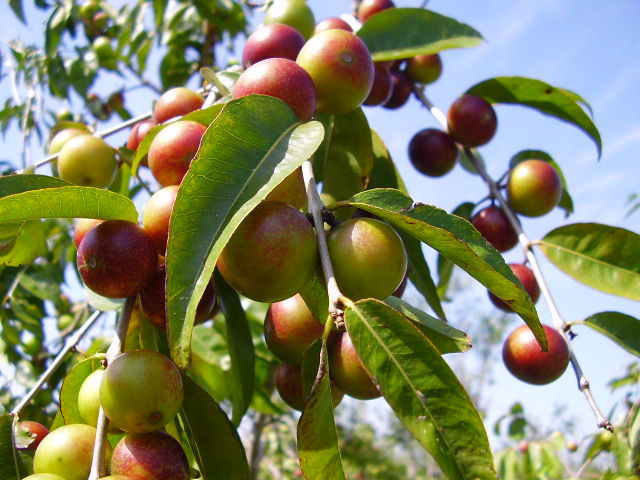Camu Camu - Myrciaria dubia

Common Names: Camu Camu, Camu-camu Negro, Camo Camo, Camocamo, Araca d’água, Araza de Agua, Psidium dubium, Myrciaria dubia, Myrciaria paraensis, Guapuro Blanco, Rumberry, Cacari
Latin Name: Myrciaria dubia
Origin: South America
Short Introduction
Camu Camu is not known to be cultivated in Europe. It is quite demanding regarding growing conditions, as it is native to the Amazonian rainforests.
Detailed Description
Camu Camu contains up to thirty times more vitamin C than even the roundest orange.
Botanical Information
Myrciaria dubia, commonly known as Camu Camu, is a shrubby, evergreen tree that grows up to 5 meters in height. This dense, bushy tree has a rounded, brown trunk and glossy green leaves. The fruit grows in clusters resembling cherries, though the individual fruits are larger. Camu Camu fruits can range in color from red, yellow, or even white. The pulp is juicy and extremely tart—the distinct sourness is a hallmark of its extraordinary vitamin C content.
Origin and Distribution
Camu Camu is native to South America, particularly the Amazonian rainforests and flooded regions. In its native land, Camu Camu is famous as a vitamin powerhouse. Today, it is exported to Europe and gaining recognition as a superfruit worldwide.
Usage / Dosage
In traditional medicine throughout South American countries, Camu Camu is recommended against viral infections (including herpes), cold sores (including shingles), and common colds. It is also used for eye health issues including cataract and glaucoma, asthmatic symptoms, atherosclerosis, chronic fatigue syndrome, depression, gum inflammation, and osteoarthritis.
Locally, Camu Camu is a popular folk remedy for eye problems, various skin issues, and to support immune system activity as an antioxidant. Globally, Camu Camu is renowned as a “vitamin bomb” due to its unprecedented vitamin C content—therefore, it is recommended for vascular health, iron absorption, cardiovascular health, and healthy circulation.
Folk medicine also uses Camu Camu for ulcers, inflammations, infections, depression, restlessness, cold sores, flu, and mild colds. Peruvian folk medicine recommends Camu Camu as a primary or adjunct therapy for arthritis, headaches, vision disorders, and toothaches. Additionally, folk tradition supports the use of Camu Camu for lifting the mood in cases of depression and for liver conditions.
Thanks to its massive vitamin C content, Camu Camu may be recommended to support immune system function, for its antioxidant action in inflammatory conditions, and to help with viral infections.
Some constituents in Camu Camu have been tested for potential anti-inflammatory effects, with results varying compared to common over-the-counter remedies. Its antioxidant profile has prompted scientific studies on Camu Camu’s possible role in preventive care against various forms of cancer. Other bioactive compounds support eye health and vision preservation.
Several Western publications have investigated the effects of Camu Camu’s constituents on degenerative cognitive decline and mood improvement (notably by Dr. Gary Null, Ph.D.).
Some athletes and trainers use Camu Camu to increase muscle mass and enhance athletic performance. There is also research suggesting potential support for the reproductive system due to its unique phytochemicals. A wealth of publications discusses the possible benefits of Camu Camu’s compounds in boosting immune function (linked to vitamin C) and in the treatment or prevention of viral and bacterial illnesses.
Active Compounds
Compared to oranges, by weight, Camu Camu provides 30–50 times more vitamin C, 10 times more iron, twice the phosphorus, three times more vitamin B3, and twice the vitamin B2. It also contains beta-carotene, flavonoids, fatty acids, gallic and ellagic acid, sodium, and proteins (with valine, leucine, and serine being the most abundant amino acids).
Traditional Dosage
For full benefit, it is recommended to take a small spoonful of Camu Camu powder three times a day, mixed into water, juice, or smoothies. Myrciaria dubia fruit is also traditionally added to ice creams and sorbets.
Just one heaping teaspoon of Camu Camu powder delivers the vitamin C of about 0.5 kg (a little over a pound) of lemons.
Warning: Exceeding the recommended daily dose may cause diarrhea.

